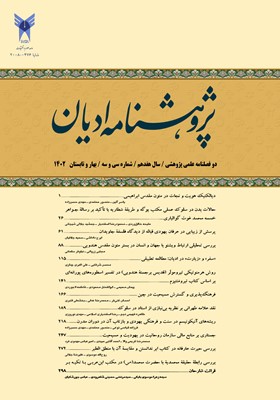دیالکتیک هویت و نجات در متون مقدس ابراهیمی
محورهای موضوعی : مسیحیت
منصور معتمدی
1
,
یاسر آئین
2
![]() ,
مهدی حسن زاده
3
,
مهدی حسن زاده
3
1 - گروه ادیان و عرفان دانشگاه فردوسی مشهد
2 - دانشکده الاهیات و معارف اسلامی دانشگاه فردوسی مشهد
3 - گروه ادیان و عرفان دانشگاه فردوسی مشهد
کلید واژه: شمولگرایی , تاریخ رستگاری, قرآن, انحصارگرایی, کتاب مقدس عبری, هرمنوتیک متن مقدس, عهد جدید,
چکیده مقاله :
سنتهای دینی اغلب دستاندرکار هویتبخشیدن به ایمان در قالب ایجاد میانذهنیتی راجع به حقیقت و نجات بودهاند. این تمهید، نهتنها به لحاظ الهیاتی از هسته کانونی پیام دین و عنصر مشروعیتبخش آن محافظت میکند، در ساحت اجتماعی نیز باعث تمایز اعضای جامعه دینی با دیگران شده و ملاکی برای داوری درباره انتساب افراد به آن دین پدید میآورد. تا آنجا که به متون مقدس ابراهیمی مربوط میشود، مختصات رابطه مومنان با خدا، بر تصور آنان نسبت به رستگاری و نیز بر کیفیت ارتباط آنان با دیگر گروههای بشری تأثیرگذار بوده و تحول این تصور در طول زمان، باعث پدیدآمدن ایدههای متفاوتی درباره هویت و نجات در سنت یکتاپرستی گردیده است. در این مقاله، با استفاده از روش معناشناختی ایزوتسو، میدان معنایی هویت و نجات در کتاب مقدس عبری، عهد جدید و قرآن بررسی شده و برای فهم جهانبینی معناشناختی حاکم بر آنها تلاش شده است. همچنین، به تکامل رویکردهای نجاتشناختی در هرمنوتیک متون مقدس ادیان ابراهیمی، در قالب بازتفسیر دیالکتیکی میراث معنوی ابراهیم در این سه دین پرداخته شده است.
A religious tradition cannot be separated from the identification of faith through the intersubjective seeking of truth and salvation. By establishing a criterion for judging the attribution of people to that religion, this provision not only protects the theological message of religion and legitimizes it, but also distinguishes religious community members from others in the social sphere. Regarding the Abrahamic scriptures, how believers envision God has had an impact on both those who are concerned with salvation and the quality of their relationships with other people. As a result of this dialectic, Abrahamic monotheism has evolved different ideas about identity and salvation over time. To understand the conceptual worldview that governs the Hebrew Bible, the New Testament, and the Qur'an, this article examines the semantic field of identity and salvation using Izutsu's semantic method. We have also discussed how salvational approaches in the hermeneutics of Abrahamic scriptures, such as the reinterpretation of Abraham's spiritual heritage, have advanced.
http://digitalcommons.macalester.edu/macintl/vol8/iss1/11
_||_


